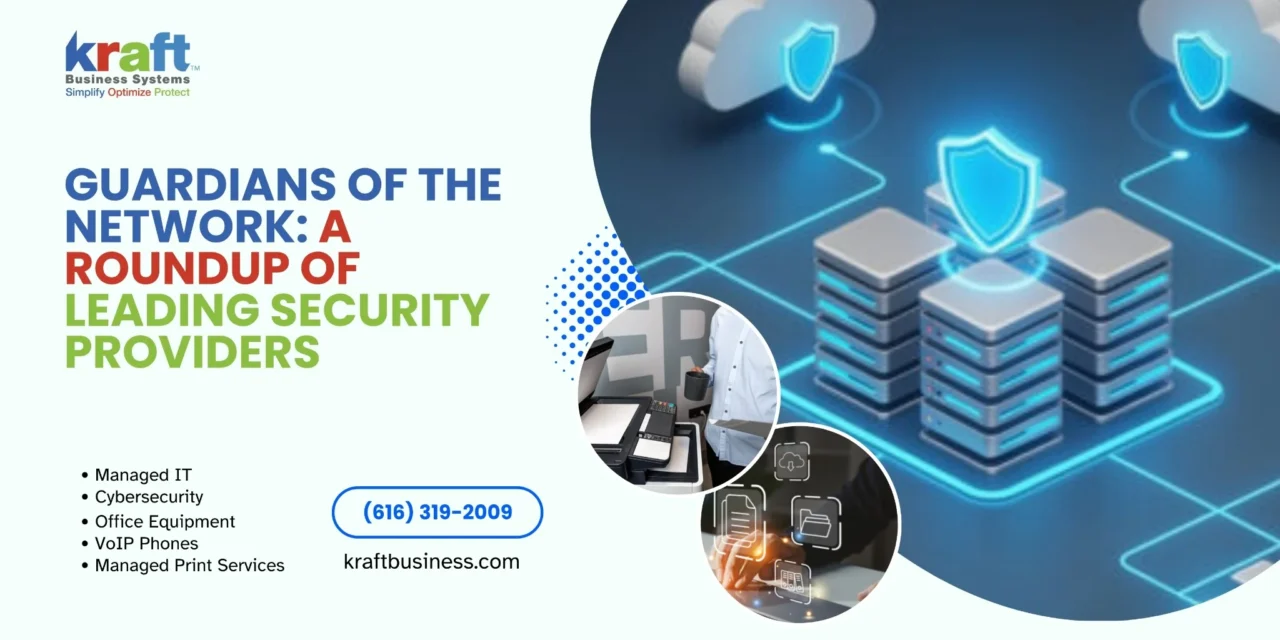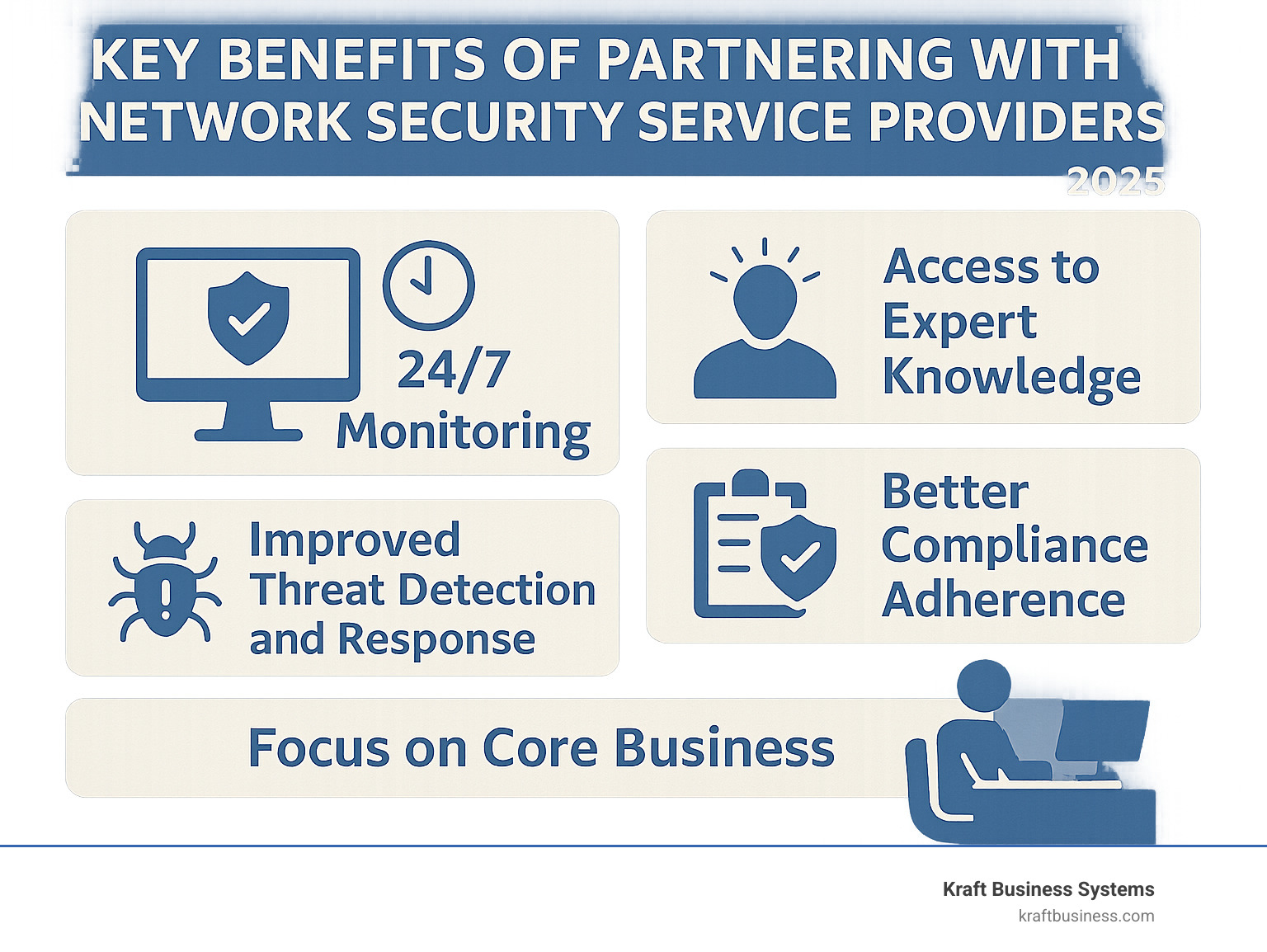Network security service providers are specialized companies that help businesses protect their digital systems from cyberattacks. They act as guardians for your computer networks, making sure your important data stays safe and secure.
Here’s a quick overview of what network security service providers do:
- They offer 24/7 monitoring to watch for threats around the clock.
- They find and stop cyberattacks before they can harm your business.
- They check your systems for weak spots, like open doors for hackers.
- They help you follow important security rules and regulations.
- They set up and manage advanced security tools for you.
Why do businesses need them? Because cyber threats are getting more complex every day. Even the biggest companies face attacks. For example, Check Point boasts an impressive 99.8% prevention rate against cyber attacks, showing how effective specialized providers can be.
Working with an expert provider means your internal IT team can focus on what they do best. They don’t have to spend all their time worrying about the latest hacks. This partnership frees them up to work on building new tools or improving your business operations.
Network security service providers basics:
The Core Arsenal: What Top Providers Offer
When you’re looking at what network security service providers can do for your business, you’re really exploring a complete toolkit designed to keep your digital world safe. Think of it like having a team of security guards, detectives, and maintenance experts all working together to protect your office building – except this building is your entire network.
The heart of most top-tier security services is something called a Security Operations Center, or SOC for short. Picture a room filled with cybersecurity experts who never sleep – they’re watching your network around the clock, looking for anything suspicious. These folks use advanced threat intelligence, which is basically insider information about the latest tricks hackers are using. It’s like having a heads-up about what the bad guys are planning before they even try it.
Beyond watching your network 24/7, these providers also handle the nuts and bolts of security management. Firewall management is a big part of this – think of your firewall as the bouncer at your network’s front door. The security team makes sure this bouncer always knows who to let in and who to keep out.
Managed Detection and Response (MDR)
Here’s where things get really interesting. Managed Detection and Response, or MDR, is like having a detective squad that doesn’t just wait for crimes to happen – they’re out there actively looking for trouble before it finds you.
Proactive threat hunting means these experts are constantly searching through your network, looking for signs that someone might be up to no good. They’re not just sitting around waiting for alarms to go off. When they do find something suspicious, they jump into action with incident response – basically, they have a plan to deal with problems quickly and effectively.
The beauty of MDR is the real-time analysis. When something happens on your network, these folks know about it immediately and can tell you exactly what it means. They also focus heavily on endpoint security, which protects all the devices connected to your network – laptops, phones, tablets, you name it. And when problems do pop up, they provide clear remediation steps to fix things and get back to normal.
SIEM and Log Management
Security Information and Event Management – or SIEM – might sound fancy, but it’s really just a smart way to keep track of everything happening on your network. Imagine if every device on your network kept a diary of its daily activities. SIEM collects all those diaries and reads through them, looking for patterns that might spell trouble.
Centralized logging means all this information gets stored in one place, making it much easier to spot problems. The system is great at anomaly detection – basically, it notices when things aren’t behaving the way they normally do. This is incredibly valuable for compliance reporting too, because many industries require businesses to keep detailed records of their security activities.
Vulnerability Management and Penetration Testing
Even the best security setup can have weak spots, and that’s where vulnerability management comes in. Vulnerability scanning uses automated tools to check your systems for known security holes – kind of like a health checkup for your network.
Penetration testing takes this a step further. Professional ethical hackers actually try to break into your system (with your permission, of course!) to see where the weak points are. It’s like hiring someone to test all your locks and security cameras to make sure they actually work.
These services also include thorough risk assessment to help you understand which problems need fixing first, and patch management to actually close those security holes once they’re found.
More info about our security services
Why Partner with Network Security Service Providers?
Think of partnering with network security service providers as adding a team of cybersecurity superheroes to your business. You get instant access to experts who eat, sleep, and breathe network security – people who know the latest threats and how to stop them cold.
The financial benefits alone make this partnership a smart move. Building an in-house security team means hiring specialized analysts, training them constantly, and buying expensive security tools. That adds up fast. When you work with a provider, you share these costs with other businesses, making world-class security affordable.
Your internal IT team will thank you too. Instead of staying up all night chasing security alerts, they can focus on the projects that actually grow your business. The result? A dramatically stronger security posture that evolves with every new threat that emerges.
Strengthening Your Security Posture
Network security service providers bring military-grade weapons to your cybersecurity fight. They use advanced tools that most businesses could never afford or manage on their own. This creates a proactive defense strategy that catches threats before they can cause real damage.
The numbers speak for themselves. Top providers achieve prevention rates above 99% against cyber attacks. That’s because they’re constantly improving their defenses, learning from every attack they see across all their clients.
These providers manage the entire threat lifecycle for you. They spot the threat, investigate it, contain it, and clean up the mess. No gaps, no missed steps, no hoping your IT person remembers the right procedure at 2 AM.
Continuous improvement is built into their DNA. While your business focuses on serving customers, they’re studying the latest attack methods and updating your defenses accordingly.
Freeing Up Your Internal IT Team
Picture your IT team without the constant stress of security alerts. No more jumping between fixing printers and hunting for advanced persistent threats. No more alert fatigue from systems that cry wolf every few minutes.
When you partner with security providers, your IT professionals can finally focus on strategic initiatives that move your business forward. They can work on that new system rollout, improve user experience, or tackle the projects that have been sitting on the back burner.
This co-managed security approach gives you the best of both worlds. You keep your internal team for the day-to-day IT needs, while security experts handle the specialized threat hunting and incident response. Your team stays focused on core business objectives instead of becoming overwhelmed by security complexity.
Achieving and Maintaining Compliance
Regulatory compliance isn’t just paperwork – it’s your shield against devastating fines and legal troubles. Whether you need to meet HIPAA requirements in healthcare, PCI DSS standards for payment processing, GDPR for data protection, or ISO 27001 for information security, the rules are complex and constantly changing.
Network security service providers are compliance experts who steer these regulatory mazes every day. They implement the right security controls, maintain detailed records, and provide audit support when regulators come knocking.
Services like centralized logging and security monitoring aren’t just good security practices – they’re compliance requirements. Providers ensure your data protection policies are actively enforced and monitored, not just written documents gathering dust in a drawer.
The peace of mind is invaluable. You can sleep well knowing that experts are keeping you compliant while you focus on running your business.
More info about our IT solutions
Key Capabilities for the Modern Threat Environment
The digital world is always on the move, bringing exciting new possibilities but also fresh challenges for network security service providers. Two big changes we’ve seen are how common cloud computing has become and the rise of hybrid workforces. This means our important data and our team members aren’t just tucked away safely within office walls anymore. They’re spread out across different cloud services and working from all sorts of locations. This shift really calls for new ways of thinking about security. That’s where ideas like Zero Trust architecture and AI-powered security step in – they’re not just fancy words, but truly essential tools for staying safe.
Securing Cloud and Hybrid Workforces
Keeping cloud environments and hybrid workforces secure means having special tools and smart plans. Old-school security that just guards the edge of your network simply won’t cut it when data lives in many clouds and your team works from anywhere. That’s why Cloud Access Security Brokers (CASBs) are so vital; they act like a friendly gatekeeper between your users and cloud services, making sure rules are followed and spotting trouble.
Another important step forward is Secure Access Service Edge (SASE). Think of SASE as combining your network’s plumbing and its security guards into one smooth, cloud-delivered service. It provides safe and fast access for everyone, no matter where they are or what applications they’re using. While VPN management is still important for secure connections, it’s now often joined by even smarter endpoint protection and Zero Trust Network Access (ZTNA). These new approaches make sure every user and device is checked out and approved before they can access anything, no matter their location.
The Impact of AI and Automation
Artificial Intelligence (AI) and automation aren’t just changing industries; they’re truly revolutionizing how we handle network security. AI-driven threat detection allows network security service providers to find clever and fast-moving threats that even the best human analysts might miss. AI can quickly sift through huge amounts of data, finding odd patterns and suspicious actions with incredible speed.
This leads to automated incident response, where AI-powered systems can automatically stop threats, isolate affected devices, or block bad traffic without needing someone to click a button. The big win here is a much faster Mean Time to Respond (MTTR) – that’s the time it takes to find and fix a security issue. It gets dramatically shorter. Services also use predictive analytics so they can often spot potential problems even before they fully develop, helping teams stay ahead of cybercriminals.
How to Choose the Right Partner for Your Business
Picking the right network security service provider is a really important choice. It’s not just about finding someone to manage your firewalls; it’s about building a solid partnership that protects your digital treasures and helps your business grow. When you’re looking for a provider, here are some key things to consider and questions to ask:
First, look at the core services they offer. Do they cover everything you need, from actively hunting for threats (MDR) and managing your security events (SIEM) to finding weak spots (vulnerability management) and helping with compliance? It’s also smart to ask about their experience with your industry. Do they truly understand the specific rules and common threats that affect your business?
Next, consider how they use new technologies like AI and automation. Are their solutions truly modern, or are they relying on older ways of doing things? Make sure to understand their Service Level Agreements (SLAs). How fast will they respond if something goes wrong? What kind of guarantees do they offer for keeping your systems running?
It’s also a good idea to check the technical certifications their team members hold. These show that their staff has proven skills. Ask about their support models too. Will someone be there 24/7, every day of the year? Do they offer dedicated account managers who know your business inside and out?
Don’t be shy about asking for references or case studies from businesses like yours. Real-world success stories can tell you a lot. You’ll also want to know how transparent they are with reporting and communication. You need clear insights into your security health. Finally, understand their incident response plan. How would they handle a major breach, and what would your role be in that process? Look for providers with a strong, trusted reputation and happy customers.
Thinking about these factors will help you choose a provider that perfectly fits your security needs and business goals, giving you reliable and strong protection.
Frequently Asked Questions about Network Security Services
We understand you might have more questions about how these services work and how they can benefit your organization. Let’s tackle some of the most common ones.
What is the difference between an MSSP and an MDR provider?
While the terms Managed Security Service Provider (MSSP) and Managed Detection and Response (MDR) provider are often used interchangeably, there’s a nuanced difference. An MSSP typically offers a broader scope of services. This can include basic security monitoring, firewall management, vulnerability scanning, and sometimes even security consulting and technology implementation. They focus on managing your security infrastructure and alerting you to threats.
An MDR provider, on the other hand, has a more focused approach. Their core strength lies in proactive threat hunting, deep detection capabilities, and rapid incident response. While an MSSP might tell you about a threat, an MDR provider will actively investigate, contain, and help remediate it. Trustwave, for example, explicitly offers both managed security services (MSS) and managed detection and response (MDR), illustrating how these capabilities can overlap or be distinct offerings. MDR services are generally more proactive and hands-on in dealing with actual threats.
How do providers help with regulatory compliance?
Network security service providers are invaluable in helping organizations steer the complex landscape of regulatory compliance. They assist in several key ways:
- Audits and Assessments: They can conduct security audits and assessments to identify gaps in your current security posture relative to specific regulations (e.g., HIPAA, PCI DSS, GDPR, ISO 27001, NIST).
- Security Controls Implementation: They help implement the necessary security controls and technical safeguards required by these regulations, such as robust access controls, data encryption, and intrusion detection systems.
- Data Protection Policies: They assist in developing and enforcing data protection policies that align with compliance mandates, ensuring sensitive information is handled securely.
- Reporting and Documentation: Providers ensure that detailed logs and documentation of security events are maintained, which is crucial for demonstrating compliance during audits. Services like SIEM are essential for this.
- Continuous Monitoring: Many regulations require continuous monitoring of security systems. Providers offer 24/7 monitoring to ensure ongoing adherence and quick detection of any deviations.
- Incident Response Planning: They help develop and test incident response plans, a mandatory requirement for many compliance frameworks, ensuring you can effectively respond to and report security breaches.
By taking on these responsibilities, providers help reduce the burden on your internal team and mitigate the risk of non-compliance.
What does the onboarding process typically involve?
The onboarding process with a network security service provider is a structured approach designed to seamlessly integrate their services with your existing IT infrastructure. While specifics can vary, it generally involves these key steps:
- Initial Assessment and Findy: The provider will conduct a thorough assessment of your current network architecture, existing security tools, business operations, and compliance requirements. This helps them understand your unique environment and tailor their services.
- Tool Deployment and Integration: This involves deploying their security tools, agents, or sensors across your network, endpoints, and cloud environments. This might include setting up SIEM connectors, MDR agents, or configuring firewall rules. They ensure these tools integrate smoothly with your current systems.
- Policy Configuration and Customization: Based on the initial assessment and your specific needs, the provider will configure security policies, alerts, and reporting mechanisms. This ensures that their monitoring and response efforts are aligned with your risk tolerance and operational priorities.
- Baseline Establishment and Monitoring Commencement: Once tools are deployed and policies configured, the provider will establish a baseline of normal network activity. After this baseline is set, 24/7 monitoring commences, allowing their SOC to identify any deviations or suspicious activities.
- Knowledge Transfer and Communication Plan: Throughout the process, there’s a focus on knowledge transfer, ensuring your internal team understands how the new services operate. A clear communication plan is also established for alerts, incident reporting, and regular security reviews.
This methodical approach ensures a smooth transition and effective security coverage from day one.
Fortifying Your Digital Future
The digital world never sleeps, and neither do the threats that target your business. Cyber criminals are getting smarter, faster, and more creative every day. That’s exactly why working with network security service providers has become essential for businesses that want to stay safe and successful.
Think of it this way: you wouldn’t leave your office doors open uped at night, so why leave your digital doors unprotected? These specialized providers offer much more than just fancy security software. They give you something invaluable – the confidence to grow your business without constantly worrying about the next cyber attack.
When you partner with the right security provider, you’re not just buying a service. You’re forming a strategic partnership that transforms how your business handles digital threats. Instead of playing defense all the time, you can actually get ahead of the bad guys.
This approach creates real business resilience. Your company can keep running smoothly even when cyber storms are brewing around you. Your employees can work productively without fear, your customers can trust you with their data, and you can sleep better at night knowing experts are watching over your digital assets.
The beauty of proactive protection is that it stops problems before they start. Rather than scrambling to fix damage after an attack, you’re preventing attacks from succeeding in the first place. It’s like having a security guard who stops burglars before they even reach your building.
At Kraft Business Systems, we’ve seen how the right security partnership can transform a business. Located right here in Grand Rapids, MI, we work with companies throughout Michigan to build digital fortresses that actually work. Our team understands that every business is different, which is why we take the time to understand your unique challenges and goals.
Whether you’re a small business in Wyoming, MI, or a growing company in Acme, we believe every organization deserves enterprise-level protection. Our diverse team of consultants and industry experts knows how to match you with security solutions that fit your budget and your needs.
Ready to stop worrying about cyber threats and start focusing on growing your business? We’re here to help you build a security strategy that works.










